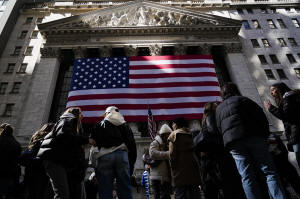Dow drops nearly 650 points on worries that Trump's latest tariffs will
slow the economy more
[March 04, 2025] By
STAN CHOE
NEW YORK (AP) — U.S. stocks tumbled Monday and wiped out even more of
their gains since President Donald Trump ’s election in November, after
he said that tariffs announced earlier on Canada and Mexico would take
effect within hours.
The S&P 500 dropped 1.8% after Trump said there was “no room left” for
negotiations that could lower the tariffs set to begin Tuesday for
imports from Canada and Mexico. Trump had already delayed the tariffs
once before to allow more time for talks.
Trump’s announcement dashed hopes on Wall Street that he would choose a
less painful path for global trade, and it followed the latest warning
signal on the U.S. economy’s strength. Monday's loss shaved the S&P
500's gain since Election Day down to just over 1% from a peak of more
than 6%. That rally had been built largely on hopes for policies from
Trump that would strengthen the U.S. economy and businesses.
The Dow Jones Industrial Average dropped 649 points, or 1.5%, and the
Nasdaq composite slumped 2.6%.
Monday’s slide punctuated a rocky couple of weeks for Wall Street. After
the S&P 500 set a record last month following a parade of
fatter-than-expected profit reports from big U.S. companies, the market
began diving following weaker-than-expected reports on the U.S. economy,
including a couple showing U.S. households are getting much more
pessimistic about inflation because of the threat of tariffs.
The latest such report arrived Monday on U.S. manufacturing. Overall
activity is still growing, but not by quite as much as economists had
forecast. Perhaps more discouragingly, manufacturers are seeing a
contraction in new orders. Prices, meanwhile, rose amid discussions
about who will pay for Trump’s tariffs.

“Demand eased, production stabilized, and destaffing continued as
panelists’ companies experience the first operational shock of the new
administration’s tariff policy,” said Timothy Fiore, chair of the
Institute for Supply Management’s manufacturing business survey
committee.
The hope on Wall Street had been that Trump was using the threat of
tariffs as a tool for negotiations and that he would ultimately go
through with potentially less damaging policies for the global economy
and trade. But Trump’s going forward with the Mexican and Canadian
tariffs hit a market that wasn't certain about what would happen next.
The market’s recent slump has hit Nvidia and some other formerly
high-flying areas of the market particularly hard. They fell even more
Monday, with Nvidia down 8.8% and Elon Musk’s Tesla down 2.8%.
Elsewhere on Wall Street, Kroger fell 3% after the grocery chain’s
Chairman and CEO Rodney McMullen resigned following an internal
investigation into his personal conduct.
Wall Street’s blue Monday even pulled down stocks of companies enmeshed
in the cryptocurrency economy, which had risen strongly in the morning.
They initially bounced after Trump said over the weekend that his
administration was moving forward with a crypto strategic reserve.
[to top of second column] |

The New York Stock Exchange is seen in New York, Wednesday, Feb. 26,
2025. (AP Photo/Seth Wenig)
 But MicroStrategy, the company
that’s now known as Strategy and has been raising money to buy
bitcoin, slid to a loss of 1.8%. Coinbase, the crypto trading
platform, fell 4.6%.
All told, the S&P 500 fell 104.78 points to
5,849.72. The Dow Jones Industrial Average dropped 649.67 to
43,191.24, and the Nasdaq composite slumped 497.09 to 18,350.19.
Across the Pacific in China, manufacturers reported an uptick in
orders in February as importers rushed to beat higher U.S. tariffs
and a Chinese state media report said that Beijing was considering
ways to retaliate.
Trump had imposed a tariff of 10% on imports from China, and that’s
scheduled to rise to 20% beginning Tuesday. He also ended the “de
minimis” loophole that exempted imports worth less than $800 from
tariffs.
In Hong Kong, Chinese bubble tea chain Mixue Bingcheng’s stock
soared 43% following its $444 million debut on the market. The
company claims to be the world’s largest food retail chain, with
more than 45,000 outlets, and its jump came as the Hang Seng index
rose 0.3%.
Indexes rose by even more across Europe and in Tokyo. European
markets leaped after a report showed an easing of inflation in
February. That should help the European Central Bank, which
investors widely expect will deliver another cut to interest rates
later this week.
Germany’s DAX surged 2.6%, and France’s CAC 40 jumped 1.1%. Stocks
outside the United States have performed better than the S&P 500
this year, even with Trump’s promises for “America First” policies
In the bond market, the yield on the 10-year Treasury fell to 4.16%
from 4.24% just before the manufacturing report’s release. It’s come
down sharply since January, when it was approaching 4.80%, as
worries have built about the possibility of a slowing U.S. economy.
Often, drops in Treasury yields can give a boost to stock prices
because they make loans cheaper to get and give a boost to the
economy. But the reason for this recent drop in yields, softer
economic growth expectations, may mean that’s not the case this
time, according to Morgan Stanley strategists led by Michael Wilson.
Typically, the Federal Reserve would cut interest rates if the
economy needs help. But when inflation is high, or at least worries
about it are, the Fed has less leeway to ease rates.
___
AP Business Writers Matt Ott and Elaine Kurtenbach contributed.
All contents © copyright 2025 Associated Press. All rights reserved |